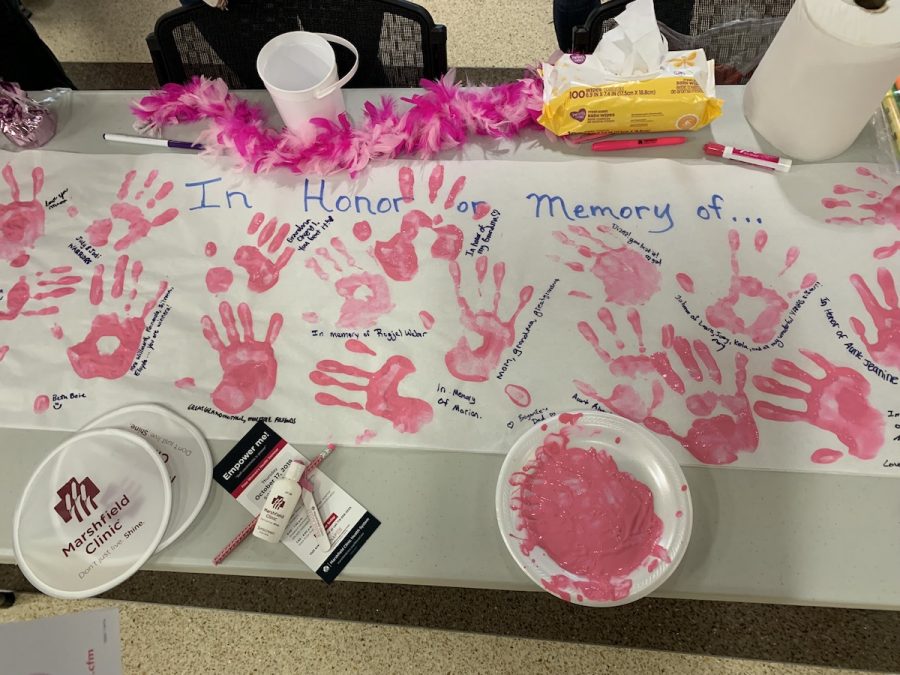College of Nursing and Marshfield Clinic collaborate to spread breast cancer awareness
The event in Davies last week consisted of education, awareness and community encouragement
More stories from Julia Lopez
Photo by Julia Lopez
“I’ve seen the hardships of breast cancer, but I’ve also seen how people grew from it,” Wusterbarth said. “It’s awesome how everybody works together as a team. We all just came together to spread awareness around campus.”
The College of Nursing at UW-Eau Claire recently collaborated with the Marshfield Clinic to give Blugolds a first-hand opportunity to learn about breast cancer from professionals as well as to offer support to patients through an interactive display in the Davies Student Center.
The event took place in the Davies Center on Friday, Oct. 4, and organizers said it will be an annual event.
The setup included a board where students could write notes of encouragement to breast cancer patients at Marshfield Clinic in Eau Claire as well as a large banner where they could add their own pink handprint in honor of or in memory of someone who had experienced breast cancer. They also provided informational pamphlets on cancer and screenings — even breast models from the College of Nursing where participants could practice performing exams and locating nodules.
Vicky Thomas, director of Services for Students with Disabilities, and Dalete Mota, an associate professor in the College of Nursing, said they collaborated to make the event possible.
Thomas said she had lost two sisters to breast cancer and that another had been recently diagnosed, so spreading awareness is especially important to her.
“Every year I do something for breast cancer,” Thomas said. “I would make these pink ribbons every year, and last year I met Professor Mota at a round table, and she saw my ribbon. We got to talking and decided we wanted to do something with the nurses and students.”
Sophia Wusterbarth, a third-year nursing student, said events like this help individuals find the positive within the negative.
“I’ve seen the hardships of breast cancer, but I’ve also seen how people grew from it,” Wusterbarth said. “It’s awesome how everybody works together as a team. We all just came together to spread awareness around campus.”
Mallory Gross, a third-year geology student who visited the tables, said the event was like a big support group.
But Wusterbarth said the event was about education as much as it was awareness.
For example, Mota said women — and men — should perform monthly breast exams so they can become familiar with what normal breast tissue feels like and could then recognize when something isn’t right.
However, she said she was surprised to learn that many students who stopped by didn’t know this.
Mota and Theresa Dachel, an assistant professor in the College of Nursing, said events like this are important because they learn what questions students have, so they can cater the next event accordingly.
Gross said these events are good for starting conversations about topics that students wouldn’t necessarily start themselves.
“I think it was a great way for students to come up and have a quick education about breast cancer,” Gross said. “It was kind of scary but really interesting.”
Gross said she was surprised to learn that finding potentially cancerous nodules can be more difficult than she thought.
Mota said she had some advice for students who were unsure of what to look for during a self-exam.
“If you feel little lumps, if the skin looks like an orange peel,” said Mota, “if you have retraction of the nipple or changes or discharge of the nipple, those are signs that should be investigated.”
However, Dachel said that just because you feel something during an exam doesn’t mean you should panic.
“Sometimes women have little benign lumps, especially around their menstrual cycle,” Dachel said. “So always note the time, because it could be a cyst.”
Mota also explained that certain factors indicate a more alarming nodule, such as hardness, redness and fixedness — as opposed to a nodule that is softer or may move around.
The best advice, of course, is to speak to a doctor if anything is of concern, Mota and Dachel said.
As a high-risk patient herself, Thomas invited her own nurse practitioner, Alice Knutson, from the high-risk breast clinic at Marshfield Clinic, to answer students’ questions about their own risk.
Knutson said high risk factors include family history, genetics and lifetime estrogen exposure, typically the amount of time between someone starting their menstrual cycle and entering menopause.
“There’s so many things you cannot change,” Knutson said. “Like, being tall increases your risk for breast cancer. Why? I don’t know, but you can’t change it. The modifiable ones are what I focus on.”
The “modifiable” things people can change include keeping your weight at a healthy BMI, as extra fat produces extra estrogen and may be feeding an estrogen-sensitive cancer.
“You don’t want to feed anything your body is managing,” Knutson said. “Diet and exercise seem to be everything these days but it’s true.”
She said healthy fats, high fibers and fruits and vegetables are all good dietary choices, but to avoid processed foods, soda and alcohol binges.
Knutson also recommends exercising 30 minutes a day, 5 days a week, to limit breast cancer risk.
The most important thing to keep in mind is to be responsible with your doctor’s visits and to “know your normal,” Knutson said.
Lopez can be reached at lopezjc7924@uwec.edu.

